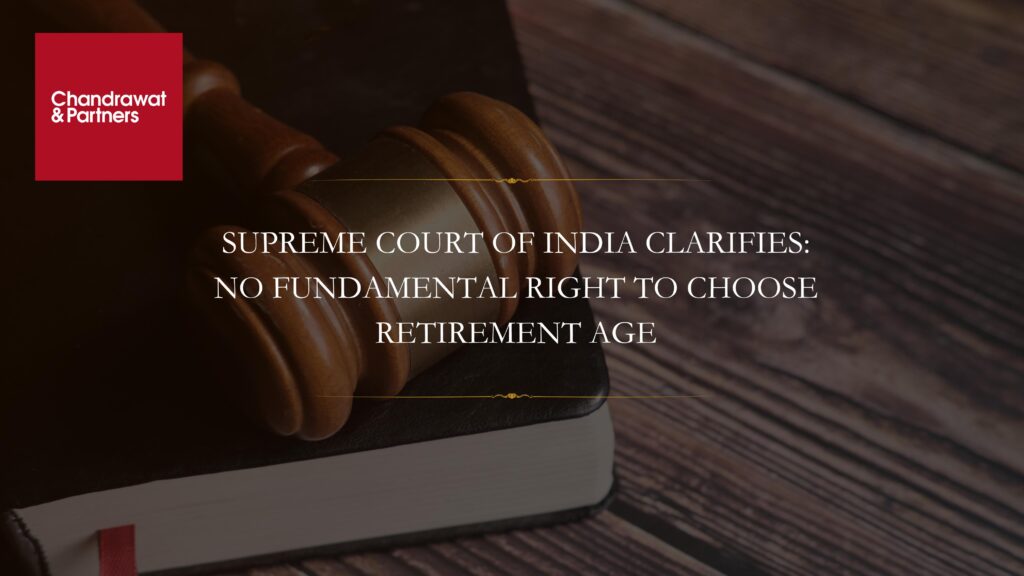Home > Recent Judgements > Supreme Court of India Clarifies: No Fundamental Right to Choose Retirement Age
May 30, 2025
Supreme Court of India Clarifies: No Fundamental Right to Choose Retirement Age
Context and Background
In a significant pronouncement, the Supreme Court of India has clarified that an employee does not possess a fundamental or inherent right to unilaterally determine their age of retirement. This judgment settles a recurring point of contention in service jurisprudence and public employment law, especially in cases involving challenges to retirement notifications, age ceilings, and premature retirements.
The ruling underscores that the authority to fix the age of superannuation lies with the *State or the employer, and is a matter of policy and statutory discretion, not a constitutionally protected personal liberty.
Key Observations from the Supreme Court
- The Court emphasized that retirement age is a matter of service condition, and it falls within the domain of the legislature or rule-making authority.
- Employees do not have a fundamental right under the Constitution to dictate or alter the age at which they retire from service.
- The Court reaffirmed that such matters are subject to the employer’s policies, which must be applied uniformly and reasonably.
Constitutional Considerations
- The judgment referenced Article 14 of the Constitution, which guarantees equality before the law and equal protection of the laws. While the Court accepted that State actions, including setting retirement age, must comply with Article 14, it clarified that:
- Equality does not mean uniform retirement for all; different classes or categories of employees may have different retirement ages, as long as the classification is reasonable and non-arbitrary.
- Judicial review is limited to testing whether the retirement age is fixed in a discriminatory or arbitrary manner – not to replace policy decisions with judicial preference.
Implications of the Ruling
- Finality to Service Terms
This ruling lends finality to employer-imposed retirement ages. Public servants or contractual employees cannot seek to extend their service tenure citing constitutional rights unless their case is rooted in clear statutory violations.
- Reinforces State Discretion
The judgment recognizes the sovereign prerogative of the State to decide matters of employment policy, including retirement, in line with administrative efficiency, workforce planning, and fiscal responsibility.
- Protects Against Arbitrary Extensions
By denying an individual-centric right to retirement age, the Court discourages a trend of discretionary service extensions which may otherwise be granted on subjective or inconsistent grounds.
- Clarifies Scope of Article 14
The ruling clarifies that equality under Article 14 applies to the process and classification, not the outcome desired by an individual. Employees can challenge retirement policies only if they are discriminatory in their application, not merely because they are dissatisfied with the age threshold.
Legal Significance
This decision will have long-term policy implications, especially for:
- Government departments and PSUs implementing retirement reforms or rationalization of workforce.
- Litigants challenging retirement notices based on claims of arbitrary treatment.
- Employment-related legislation and rules, particularly where different retirement ages are prescribed based on job profile, category, or organizational needs.
It may also impact ongoing or future disputes where employees seek re-engagement or challenge non-extension of tenure, citing unequal treatment.
Conclusion
The Supreme Court’s judgment marks a reaffirmation of judicial restraint in service policy matters. While ensuring adherence to constitutional principles, the Court has drawn a clear boundary around what constitutes a fundamental right in the employment context.
The message is clear: Retirement age is a policy matter – not a personal choice. As long as policies are reasonable, non-arbitrary, and comply with constitutional equality, employees must adhere to the age of superannuation determined by their employer or the relevant statutory authority.
For more information or queries, please email us at
enquiries@chandrawatpartners.com





